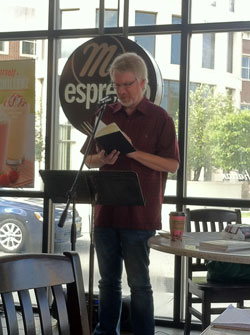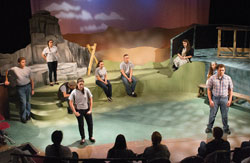The Manhattan Bagel in Red Bank, NJ, served as the host of this month’s River Read Reading Series, coordinated by Linda Jade and Gregg Brown, on Saturday, Sept. 20. This community-focused event brings celebrated poets into a close setting with a few dozen eager listeners, letting them autograph their works for paying fans, and ends with an open mic for aspiring writers to share their own work.
Dr. Michael Waters, Professor of English, was in attendance, as was former University professor Lauren Schmidt, among a few University students. This installment featured Philip Memmer and Gerry LaFemina.
Memmer is the author of four books of poems, including “The Storehouses of the Snow: Psalms, Parables and Dreams” (2012) and “Lucifer: A Hagiography” (2008). His poems have appeared in journals such as “Poetry,” “Poetry Northwest,” and “Poetry London.” He lives in upstate NY, where he directs the YMCA’s Downtown Writers Center, and also serves as Associate Editor for Tiger Bark Press.
LaFemina is the award-winning author of 11 books of poetry and prose poetry, as well as a collection of short stories and a novel. His latest collection of poems, “Little Heretic,” came out earlier this year, and recent poems have appeared in such magazines as the American Poetry Review and The Sun. He serves as Executive Director of Poets at Work, and directs the Center for Creative Writing at Frostburg State University, where he is an Associate Professor of English.
The event opened with Jade taking the microphone, briefly welcoming the audience and thanking its members for their attendance on “this fluky summer day.” She then introduced Memmer, who spoke first, by noting that his poem “Psalm” was “so simply profound that it reminded me of the ‘Cosmos’ series. I had chills going down my spine.”
Memmer began by talking about having grown up in Holmdel, and how some of his work is influenced by the local area. The first piece he read, titled “Psalm” (there were numerous poems sharing that title), was based on a strip mall that remains standing today. It evoked reverent yet decaying imagery, describing the building as “twice a week watered by hope, that again dropout.” In another line, he says, “I envy those trees the stakes and cables that hold them true,” referring to the trees along the highway.
Having grown up with a Catholic upbringing, many of his poems feature religious ideas and Bible passages, such as a piece about three thieves who break into three separate houses — but the third, rather than rob it, finds the front door open “as it always was,” and decides to straighten the place up, ultimately painting his name on the mailbox and deciding to live there. The poem concludes with, “You must find the kingdom empty and make it yours.”
The final piece in his set was from the perspective of a god who tries to get his subjects to pay attention to his teachings, but “nothing worked […] I came to you as wealth and famine, as thunder and as drought,” without effect. In the end, Memmer says, “I came to you as darkness and as silence. Enamored by absence, now at last, you see me. Now, at last, you hear me.”
With that, he gave the microphone to Jade, who repeated that she had chills before introducing LaFemina, who had a similar background to Memmer and drew on related imagery, though his work was more prose poetry.
Beginning by talking about how “longing has such a sense of history,” he quickly established that, though from related backgrounds, they were very different writers, continuing this idea into a story of giving a former lover fifteen dollars to finance her crippling drug addiction.
“Michael doesn’t believe in prose poems,” LaFemina said, indicating Waters, “which is why my first book of prose poetry is dedicated to him.” This light joke drew laughter, especially from those who knew the professor, and LaFemina segued quickly into “Sunday Girl,” where he writes about almost getting a phone number from Blondie, the former music artist, but their union is cut short by a car colliding with a hot dog vendor nearby.
LaFemina had no qualms about mentioning that his piece “Pancake House is Made of Pancakes” came from a former student yelling, “This is impossible! Let’s see you do it!” when she was told to write a poem based on that title. Later, he’d add, “I’m a firm believer in doing the assignment to stop their [the students’] insubordination.”
His set ended with “Papyrus,” a poem both about exploring Egypt and about exploring human nature, best emphasized in describing the Sphinx as “half man, half lion, no roar.”
Returning to the microphone, Jade thanked the poets and the group took a break for the poets to sign and discuss their work. Once this concluded, a variety of fledgling writers took the stand, including, among a half dozen others, a sixteen-year-old girl named Stella and Christopher Bogart, a graduate English major.
“I suggest every student writer and every student poet take advantage of this,” Bogart said. “I find what I did today very helpful.”
Schmidt read a piece as well, one based on her experience volunteering in a transitional housing program for homeless mothers, during which a caretaker told her she couldn’t have empathy for those women. The poem responds, “When I look at you, I understand the beast more plainly,” and ends saying she’d rather be destroyed by empathy than resist it.
After, Waters said, “It was a great reading, and it was great to be able to see Lauren.”
Brown noted that this program has been running for almost eight years, and that he is “always pleasantly surprised at the quality of the reading and the intimacy of the audience.”
Jade agreed, adding, “I’m grateful for everyone who came out.” When asked about the younger audience members, she said, “An important part of learning to write is listening to poets and your peers.”
The River Read series is held every Saturday from 2:30 — 4:00 in the Manhattan Bagel in Red Bank, NJ, found at 20 Water Road.
PHOTO TAKEN by Kevin Holton



